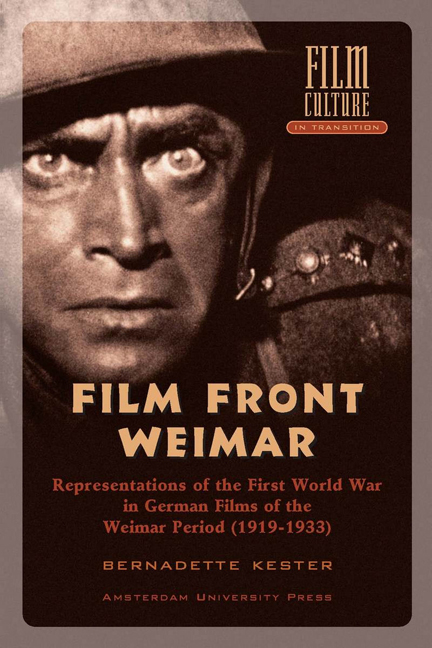 Filmfront Weimar
Filmfront Weimar Book contents
- Forntmatter
- Contents
- Preface and Acknowledgements
- Introduction
- Chapter 1 ‘Lehrreich Und Amüsant’ – Historical Films in the Period 1896-1933
- Chapter 2 ‘Die Legende von der Unschuld’ – Films about the Run-Up to the war, Especially 1914. DIE LETZTEN TAGE VOR DEM WELTBRAND
- Chapter 3 ‘Das Dokumentarische Gewinnt die Oberhand’ – Archival Footage and Constructions in War Films
- Chapter 4 ‘Wenn Wir Helden Wären, Wären Wir Schon Längst Daheim’– Realism and Anti-War Tendencies in Four Films
- Chapter 5 ‘Auf Dem Meere, Da Ist Der Mann Noch Etwas Wert’ – Films About the German Navy During The First World War
- Chapter 6 ‘Neid, Leid, Tränen – Das Ist Der Krieg’– Gender and War Films
- Epilogue
- Notes
- Credits Weimar War Films
- Archives and Libraries
- Bibliography
- Index of Names
- Index of Subjects
- Forntmatter
- Contents
- Preface and Acknowledgements
- Introduction
- Chapter 1 ‘Lehrreich Und Amüsant’ – Historical Films in the Period 1896-1933
- Chapter 2 ‘Die Legende von der Unschuld’ – Films about the Run-Up to the war, Especially 1914. DIE LETZTEN TAGE VOR DEM WELTBRAND
- Chapter 3 ‘Das Dokumentarische Gewinnt die Oberhand’ – Archival Footage and Constructions in War Films
- Chapter 4 ‘Wenn Wir Helden Wären, Wären Wir Schon Längst Daheim’– Realism and Anti-War Tendencies in Four Films
- Chapter 5 ‘Auf Dem Meere, Da Ist Der Mann Noch Etwas Wert’ – Films About the German Navy During The First World War
- Chapter 6 ‘Neid, Leid, Tränen – Das Ist Der Krieg’– Gender and War Films
- Epilogue
- Notes
- Credits Weimar War Films
- Archives and Libraries
- Bibliography
- Index of Names
- Index of Subjects
Summary
Most of the German films about the First World War that were made during the Weimar Republic have been discussed in this study. Twenty-five of the more than thirty war films have been extensively reviewed, all of them films in which the fates of the individual characters are influenced by the war in a very explicit way. All of the films that have been dealt with in this study, except for one, were made in the period 1925-1933.
One of the starting points for this book was the premise that the films contributed to Germany's efforts to come to terms with the First World War. This premise was based on the assumption that, generally speaking, telling or representing narratives is a condition for or means of coming to terms with traumatic events. Narratives create meaning, and they are therefore able to make the war past a subject of discussion, to make it bearable and digestible. The question of the moral implications of this process of ascribing meaning to traumatic events has not been asked, and it figures only very implicitly in this study. The films have been considered in their own contexts as much as possible, and not, as was done in earlier research (Kracauer) in the light of the later rise of Nazism.
The above begs the question how, that is, in what different ways, the war was represented in the twenty-five films. In order to answer this question, it was necessary to analyse the films that have been preserved and to collect as much background information about them as possible. Besides that, it was important to listen to the ‘voices’ of contemporary German society. The only direct and verifiable statements that have been made about the war films come from film critics. The broadness of the political spectrum which they represented through their specialist or daily publications gave me the opportunity to present the various perspectives on the war films.
The analysis of the twenty-five films has not led to the conclusion that, in fact, twenty-five different narratives were constructed. Although all the films have their own special characteristics, their uniqueness is only relative. It proved possible to arrange the films into a number of groups based on thematic or stylistic similarities.
- Type
- Chapter
- Information
- Filmfront WeimarRepresentations of the First World War in German Films from the Weimar Period (1919–1933), pp. 219 - 226Publisher: Amsterdam University PressPrint publication year: 2002


